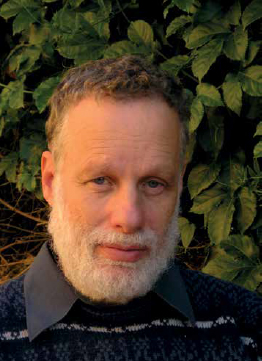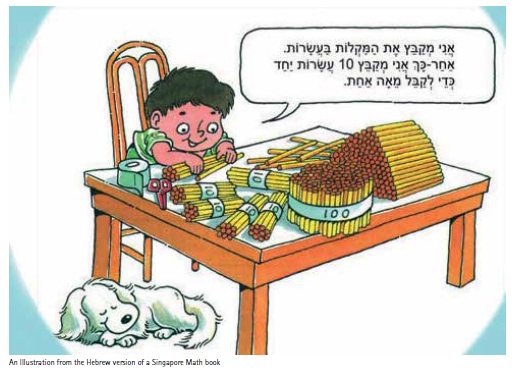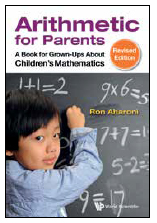 Dr. Ron Aharoni is a mathematics professor at Technion - Israel Institute of Technology. One of the world's leading combinatorialists, Aharoni is also a vigorous champion of mathematics education. He is the author of Mathematics, Poetry and Beauty, which won the CHOICE Outstanding Academic Title 2015 Award. He is also the author of Arithmetic for Parents, based on his experience teaching mathematics to elementary school children. He shares some of his thoughts with readers of EduNation below.
Dr. Ron Aharoni is a mathematics professor at Technion - Israel Institute of Technology. One of the world's leading combinatorialists, Aharoni is also a vigorous champion of mathematics education. He is the author of Mathematics, Poetry and Beauty, which won the CHOICE Outstanding Academic Title 2015 Award. He is also the author of Arithmetic for Parents, based on his experience teaching mathematics to elementary school children. He shares some of his thoughts with readers of EduNation below.
EN: Mathematics is, of course, just one part of a holistic education. Could you comment on the importance of mathematics relative to other subjects commonly found in most primary school curricula (e.g. languages, science, social studies etc.), and how mathematics relates to these other subjects?
RA: Instead of an answer - a story. A couple of weeks ago I taught a third grade class. The topic was the multiplication table. I asked a student to come to the front of the class, and raise both hands - how many tens do you see? - I asked. One ten, they said. One times 10 is 10, we all said aloud. Now put down one finger, I asked. What do you see? One times 9 is 9. Now I asked another student to come to the front of the class, they both raised all fingers - 2 times 10 is 20, we all said. Now let each of you put down one finger - what do you see? 2 times 9. And how many fingers did they put down together? 2. So 2 times 9 is 20-2. We continued like this - it doesn't take that long. When we got to having 7 students come to the front of the class, I asked the class - before they raised their hands, please tell me how do you calculate 7 times 9? They knew: 70 - 7. The entire class was filled with joy. They understood a principle, and they were happy about it.
For me, this is the real benefit of learning mathematics: the recognition that there is joy in understanding, and that ideas can be beautiful. A child who experiences this joy will transfer it to other subjects, and will be able to appreciate the beauty of (say) the Darwinian idea of natural selection. Mathematics is the epitome of abstraction, and it is the best place to have this experience.
And of course, mathematics is the most applicable subject of all, in everyday life and in science.
EN: In the preface to Arithmetic for Parents, you describe how, in your early lessons, you over-estimated children's power of abstraction, and at the same time, you realised the power of words and of interactive discussion. You also stressed the importance of words as "the scaffoldings that allow the building of high towers of ideas". This seems to point to the importance of language in learning mathematical concepts. In your opinion, is it necessary that children have an adequate grasp of the language used in arithmetic before the concepts are introduced? How much of this mathematical language should children have learned by the end of their preschool years?
RA: People, not only children, do not understand abstractions. You learn abstractions from examples. From doing things yourself. A child should learn the principle of the decimal system, which is gathering objects in tens, by gathering tens of objects in tens, and tens of tens in hundreds. Again and again. Messi did not learn how to play football from lectures.

That concrete experience is the king's road to abstraction is self-evident. What was surprising for me when I taught in elementary school was the importance of language as opposed to intuitive understanding. Mathematical discussion, using precise terminology, is invaluable. Here, too, the skill will spill over to other subjects. Fine distinctions should be made, for example, the distinction between "2 times 3" and "3 times 2", the different meanings of subtraction and the different meanings of division. By the way, I learnt the importance of the latter from the Singaporean textbooks.
Why are words so important? Because they are the cement holding together the bricks of ideas. Principles that are formulated in words will be remembered, and can serve as scaffoldings upon which the next ideas can be constructed.
The early 1990s saw the beginning of an educational trend of individual learning. The idea has some natural justifications, but it has two drawbacks. One is inefficiency, and the other, the more important one, is the renunciation of class discussion. The best way to reach precise formulations is to discuss them with the entire class.
So what vocabulary should students know at the end of preschool? The more the better. Young children love words. Of course, the introduction of words should be gradual. Preschool students should first know spatial and temporal concepts - above, below, before, after. And they should be accustomed to sorting objects, which means gathering them into groups: this is the most basic mathematical operation.
Having mentioned the Singaporean textbooks, let me tell a bit about the Israeli experience with these books. We translated them into Hebrew, and for a few years they were used in about 10% of the schools in Israel. Their use has declined since because the order of the topics introduced is different from that of the Israeli curriculum, and since they rely on class discussion more than is customary in Israeli education. But their spirit - mainly the stress on the meaning of the operations - has blissfully permeated other Israeli systems of books.
EN: How can your book Arithmetic for Parents be useful to Singapore parents in their journey with their children through primary school mathematics?
I think that the main benefit will be in increasing the familiarity with the educational principles expounded in the book. These include the importance of going step by step (as opposed to teaching haphazardly, and teaching sophisticated tricks), the importance of concrete experimentation, the stress on the meaning of the operations (as opposed to their calculation), the use of precise words and asking the student to communicate in precise terminology.
Finally, I want to comment on the trend of "self-discovery" which has gained popularity over the last twenty years. There is basic truth in the idea that principles should not be imposed on the child, but be drawn from him or her. See, for example, the activity described in the beginning of this interview of discovering that 9 times a number is 10 times the number minus the number. But this should be directed and closely monitored by the teacher. The discovery cannot be open. And it should not come at the expense of the orderly construction of knowledge, step by step, omitting no crucial layer of knowledge. And it should not be of sophisticated ideas - even the simplest ideas, like the concept of addition and how do you do "9 + 4" (that includes gathering a ten) should be taught by guided discovery, through experimentation.
 Arithmetic for Parents (Revised Edition) by Ron Aharoni.
Arithmetic for Parents (Revised Edition) by Ron Aharoni.
World Scientific Pu-blishing Co, 2015. Softcover, 212 pp, US$26 / £17 / SGD28. ISBN 978-981-4602-90-7.
More information can be found at https://goo.gl/E8mdXN
|